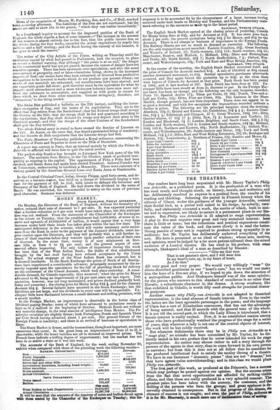THE THEATRES.
Our readers have long been acquainted with Mr. Henry Taylor's Philip van Artevelde, as a published poem. It is the production of a man who has read much, and thought much, on history, morals, and aesthetics, and has deliberately resolved to express in a poetical form the results of his reading and thinking. Selecting the period in Flemish history when the citizens of Ghent, under the guidance of the younger Artevelde, resisted their feudal lord, as a period well suited to his design, he soberly, care- fully, and elaborately executed a work, the merits of which, both in mat- ter and in expression, are likely to secure it a permanent place in our lite- rature. But Philip van Artevelde is ill adapted to stage representation, A play in five acts requires very great and very sustained interest: here there is little or none; but the reflections and poetical expressions consti- tute the value of the book, and the more slowly it is read the better. Strong passion of some sort is required to produce strong sympathy in an audience; but Mr. Taylor has deliberately eschewed everything of the sort. His hero is presented as an ideal of wisdom; whose acts, motives, and opinions, must be judged by a far more patient tribunal than the mixed audience of a London theatre. He has cited in his preface, with some triumph, Shaksperes ideal of a man as described by Hamlet:
" Give me that man That is not passion's slave, and I will wear him
In my hearts core, ay, in my heart of heart,
As I do thee."
All very good and very proper. We would very willingly " wear " the above-described gentleman in our " heart's core," but we would not make him the hero of a five-act play, if we hoped to pin down the attention of a metropolitan public. And Shskspere himself was of the same opinion; for the person who answers to this standard of excellence is no other than Horatio, a subordinate character in the drama. A strong weakness, like that exhibited in Othello, is worth fifty weak strengths for practical drama- tic purposes. Another reason why Philip van Artevelde is not adapted to theatrical representation, is the total absence of female interest. Even to the reader the ladies are the least agreeable personages in the poem; and the language of Clara has a sort of Elizabethan coarseness, that has not the advantage of being natural, and that ill accords with the general tone of the whole. It is not till the second part, in which the Lady Elena is introduced, that a female interest is really excited. Now, it is an established maxim among those who have professionally watched the progress of the stage for a series of years, that wherever a lady is not one of the central objects of interest, the work will be but coldly received.
But whatever deficiencies there may be in Philip van Artevelde as a " stage play," no mistake has been committed by Mr. Taylor, for he dis- tinctly stated in his own preface that he never intended his work for stage representation. An author may choose rather to tell a story through the persons of the agents in that story, than to come forward in his own person as narrator; but from this it does not at all follow that he oonsiders he has produced intellectual food to satisfy the motley throng of a theatre. We have in our literature " dramatic poems " that are not " dramas," but that have agreat value notwithstanding; and in this class we would place Philip van Artevelde.
The first part of this work, as produced at the Princess's, has a success which may perhaps be quoted against our opinion. But the success arises from the fact that novel opportunities are afforded for striking visible effects, and that these are really produced in a very splendid manner. The greatest pains has been taken with the scenery, the costumes, and the drilling of the persona who form the groups; and great applause is de- servedly obtained in consequence. But in the progress of the drama, the element of success is not sought; and even the part of Philip, arduous as it is for Mr. Macready, is much more one of declamation than of acting.


























 Previous page
Previous page